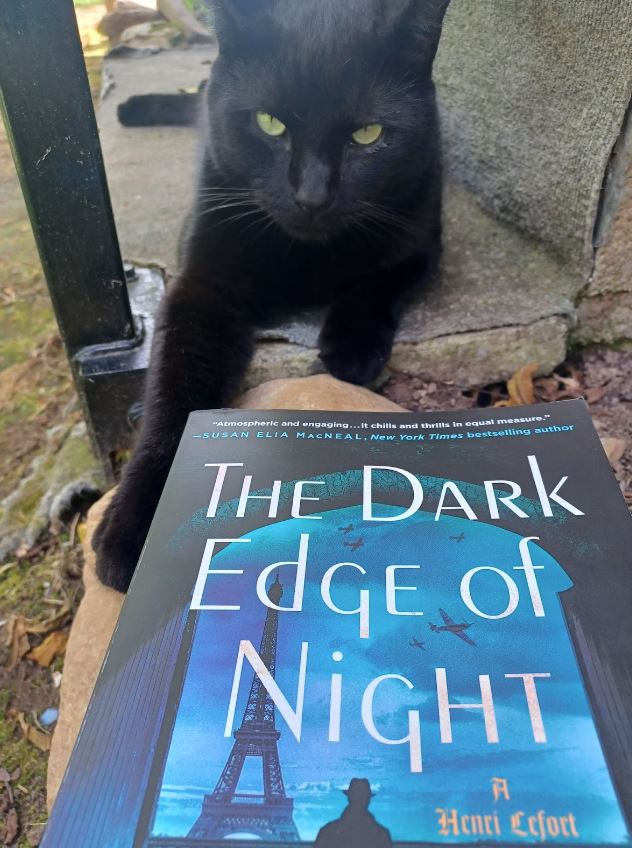by Nicole Yurcaba

I love it when, on an August Saturday, I can sit with a book and a glass of Brightlands sweet pineapple wine and let the afternoon hours drift into evening. While I always keep a few beers and a bottle of wine in the refrigerator, it is very rarely that I find a book that can keep me engrossed for hours. This summer, I’ve been really fortunate, because there have been at least two or three books that have cast their spell and kept me in their pages. The latest one, Mark Pryor’s The Dark Edge of Night, a thriller published by Minotaur Books, has a much needed message for contemporary readers despite its setting in Nazi-occupied Paris.
Set during the winter of 1940, The Dark Edge of Night transports readers into the harrowing lives of everyday Parisians during Nazi occupation. Police Inspector Henri Lefort prefers to not work with the Nazis who have overtaken his precious city, but, unfortunately, he must either obey them or find himself among the many Parisian citizens who disappear each day from the city. When the Gestapo orders him to investigate the strange circumstances surrounding the disappearance of neurologist Dr. Viktor Brandt, Henri doesn’t abandon his real job for working for the enemy. After a botched burglary leaves a Frenchman dead, Henri uncovers a strange connection between the victim, the victim’s brother, and the missing neurologist. From there, his investigation takes a disturbing and unnerving turn, one that leads Henri into the evil realm of Nazi experimental programs.
As the war in Ukraine rages and thousands continue to be displaced, and as many academics begin to use the word “genocide” to describe the horrific events unfolding on Ukrainian soil, the novel’s depiction of the Nazi occupation of Paris will probably resonate with anyone paying attention to current events. In the novel, just as in the current European theater under attack, American involvement (and at the time of the novel’s setting, lack of) in the war centers many Parisians’ conversations. Henri is most forthright with his criticism of the lack of American involvement, stating to his colleague, Moulin, “‘Not sure we should support the bastards since they won’t support us.’” Henri’s criticisms come from a deeply personal place. Readers learn that he served in World War I and witnessed unspeakable violence in the trenches. He describes America’s hesitancy to intervene quite directly: “‘They were late for the last war, maybe they’re just late for this one.’” America’s involvement in wars and conflicts across the globe has always been a flashpoint for politicians and the public, and the war in Ukraine has drawn significant ire from critics who claim the US should not involve itself in the war.
However, part of The Dark Edge of Night’s charm is that it places citizen actions–like the efforts of the French Resistance and brave journalists–above military heroism. Pryor’s novel is home to many such characters, including a prostitute who infects herself in order to spread sexually transmitted diseases to the enemy. Henri, nonetheless, is the type of character for which readers can easily develop a soft spot. He is a man riddled with flaws, but he is a man bound by humanity and empathy. Thus, when his investigation leads him to the fringes of Aktion T4, Henri devises a plan to disclose the Nazis’ actions to the world.
Nevertheless, despite the novel’s fictionality, what readers must realize is that Aktion T4 was, horrifically, a real euthanasia program implemented by the Third Reich. The United States Holocaust Museum website states, “In the Nazi context, however, ‘euthanasia was a euphemistic or indirect term for a clandestine murder program.’ The program resulted in the murders of at least 10,000 physically and mentally disabled children, and that number is a conservative estimate.
While The Dark Edge of Night is a fast-paced thriller that will keep readers guessing and enthralled, it is also a novel that offers a lot of commentary about the dangerous rise of the alt-right in the US and abroad. Henri makes a statement that, when considered in the context of American right-wing politics, is unnerving: “‘They are obsessed with human imperfection. That’s why they hate anyone who doesn’t look like them. Jews, Black people, cripples, people born with disabilities. They see them all as deficient, defective, and they want to eliminate them.’” In the United States, racist rhetoric permeates the Republican platform. Democratic voice Juan Williams has even described the GOP as “the party of white nationalism,” with 85% of non-Hispanic whites comprising the majority of the party’s demographics. Recently, the NAACP issued a travel advisory for the state of Florida, and, in Jacksonville, a racially motivated shooting has left three African-Americans dead.
In as much as it is a depiction of the past, The Dark Edge of Night is a warning about a future in which the prejudices of one group dictate another’s right to live. Thus, Mark Pryor’s latest transcends its genre’s confines, and the latest installment in Henri Lefort’s adventures more than just another crime thriller. The characters are resilient and timeless, and Lefort and his friends offer readers notable lessons on what it means to be brave in the face of oppression.
Nicole Yurcaba (Ukrainian: Нікола Юрцаба–Nikola Yurtsaba) is a Ukrainian (Hutsul/Lemko) American poet and essayist. Her poems and essays have appeared in The Atlanta Review, The Lindenwood Review, Whiskey Island, Raven Chronicles, West Trade Review, Appalachian Heritage, North of Oxford, and many other online and print journals. Nicole teaches poetry workshops for Southern New Hampshire University and is a guest book reviewer for Sage Cigarettes, Tupelo Quarterly, Colorado Review, and The Southern Review of Books.



What an extraordinary review. I’ve always thought the reason I read so many novels centered in France during the Nazi occupation is based on the little we learned in school and the overwhelming coverage I grew up reading in my Grandfather’s collection of old Life Magazines. I just needed to know more, more about why people did or didn’t do what they did. And as your reviewer said, today’s news reeks of an all to similar smell. I can’t wait to read the book, but this reviewer did such a great nod, I’ll probably go with five thumbs up.